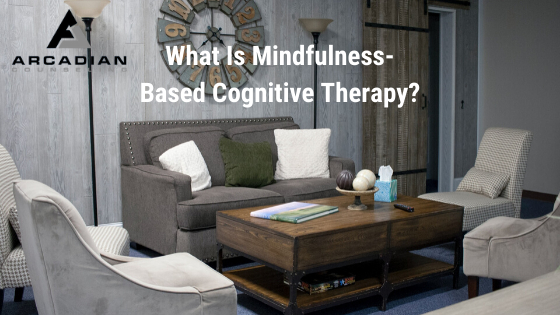It seems mindfulness is all the rage these days. But what exactly is Mindfulness-Based Cognitive Therapy (MBCT)? It’s a form of therapy that uses mindfulness practices like breathing exercises, meditation, and increased self-awareness to help you break free of unhelpful thought patterns and behaviors preventing you from engaging in life. Basically, it blends time-tested, old-school cognitive therapy methods with meditative principles.
Mindfulness is the practice of being aware of our thoughts and feelings on a continuous basis with an attitude of acceptance and curiosity – not judgment. Cognitive therapy is the process of exploring thoughts, their origins, and determining their usefulness as it relates to your life’s values and goals.
Mindfulness-based Cognitive Therapy is a powerful tool that has been shown to be effective in the treatment of depression, anxiety, grief, and more.
What can mindfulness-based cognitive therapy treat?
Mindfulness-based cognitive therapy was first developed to prevent individuals who are struggling with repeating episodes of depression and anxiety from relapsing. Studies have found mindfulness-based cognitive therapy to be very effective at helping people with major depressive disorder, bipolar disorder, anxiety, grief, anger, self-confidence and self-esteem issues, and more.
How Does Mindfulness help depression and anxiety?
Mindful meditation isn’t just for monks and yogis anymore. Every day, more and more people are reaping the major mind and body benefits through mindful meditation. But don’t worry, I’m not talking about “clearing the mind” type meditation. Trying to “clear your thoughts” or “stop your thoughts” is like telling yourself not to be cold when you’re standing outside naked in the snow.
Anxious and depressed people suffer with rumination and racing thoughts. Essentially, they become stuck in mental patterns. They often mistake these unhelpful patterns for problem-solving, but in reality, rumination and racing thoughts prolong a negative mental state.
Mindful meditation works by disrupting the mental process of rumination and racing thoughts. When you focus your mental attention on the present moment, you cannot ruminate. While it’s hard for any person to completely stop the mental process of rumination, it’s our choice whether or not we engage with it.
Mindful meditation teaches us how to respond to stress with an awareness of what is happening in the present moment, rather than reacting instinctively. Usually we get caught up in emotions and then engage in unhelpful behaviors like disconnecting from the world or avoiding people, places, and things. As our awareness increases and improves, we can develop more adaptive reactions to difficult situations so we can continue to engage in life in a meaningful way.
What Are Some Mindfulness Techniques?
There are tons of mindfulness-based exercises you can do to help with anxiety, depression, grief, anger, and more. From breathing exercises, to body scans, to engaging in daily mindful activities such as mindful showering, eating, walking, stretching, and more. With the right training and a bit of self-compassion and patience, you can turn any activity into a mindfulness exercise.
This is when life gets so much easier and things start to slow down. Focus. Concentration. Contentment. Peace.
Generally speaking, it’s best to start off with foundational mindful breathing exercises that are practiced daily. These can literally be for just a couple minutes while you start building new habits. It’s helpful to think of this just like exercising; you’re training your mind and brain to behave in a new way. It takes time and practice so the more you do it the better. But don’t worry, you don’t have to set aside 60, 30 or even 15 minutes if you can’t find the time in the beginning.
How to find a Mindfulness-Based Cognitive Therapist
Finding the right mindfulness-based cognitive therapist requires a little bit of research and the willingness to be patient. You can simply search for a mindfulness-based cognitive therapist in your area on google. Start making phone calls or sending emails. Request a phone consultation first to see if you feel like you can talk to the therapist and if they will be a good fit.
Beyond looking at the credentials, you want to find a therapist you feel comfortable talking to. Studies have shown that it’s not the degree, the school, the initials after the name, but the relationship with your therapist that is the biggest indicator of successful therapy. Believe it or not, it’s not even the type of therapy practice. However, mindfulness is for everyone and can significantly improve the quality of your life.
Once you find a therapist you’re comfortable with, they will lead you in meditations and breath work as well as techniques to help with the cognitive work such as exploring the relationship between your thoughts and how they make you feel. Your therapist will also most likely give you exercises to practice the breathing and meditation techniques you learned in session. Just like you can’t learn karate from reading and talking about it, if you want to learn mindfulness skills to improve the quality of your life, career, and relationships, you have to practice.
Life is too short to spend it struggling with anxiety, depression, grief, or anger. If you find yourself struggling too often, find a skilled therapist you connect well with to help you.
James Killian, LPC is the Principal Therapist & Owner of Arcadian Counseling in New Haven, CT where they specialize in helping over-thinkers, high achievers, and perfectionists take control and move From Surviving to Thriving.





